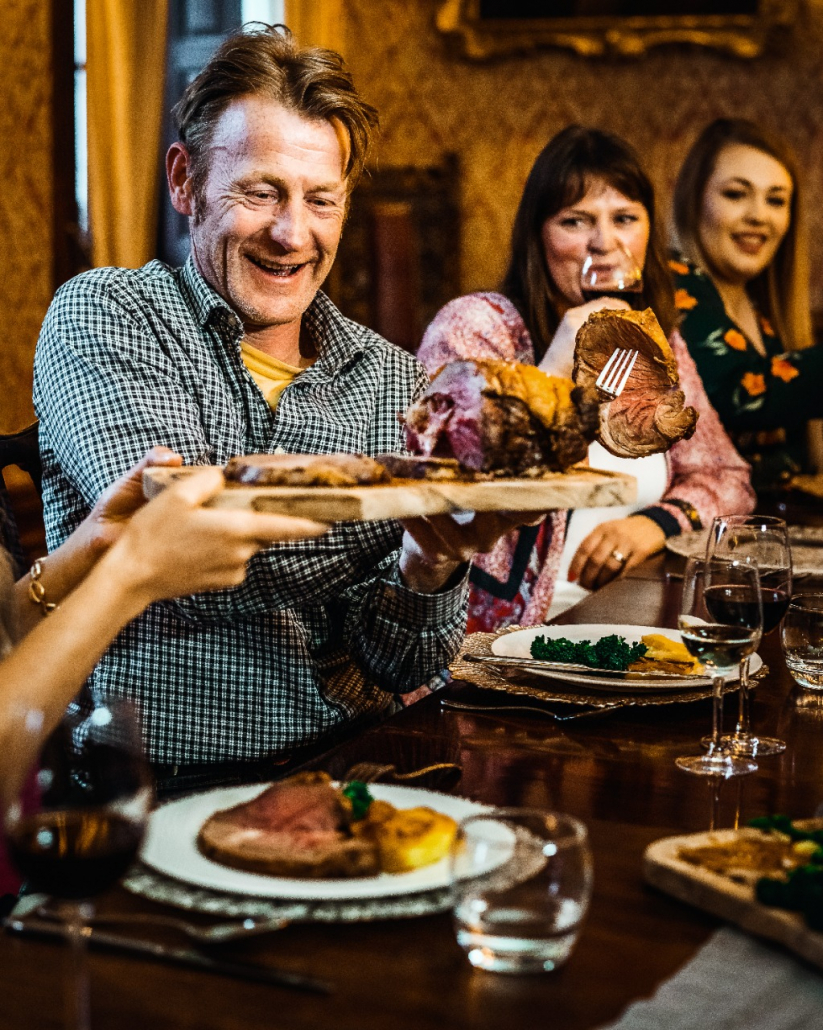
How to eat mindfully over the festive season
Between the excitement of the festivities and the abundance of food choices at holiday meals, how do we enjoy ourselves freely without overindulging and overwhelming ourselves and our bodies? Being mindful about what you eat is not just about the act of eating but also about your relationship with your body, how attuned you are to it, as well as your beliefs surrounding food and eating habits. Here are some ways to help you enjoy all the delicious foods and celebrations during the holiday season, whilst staying in touch with your body and knowing your limits.
Physical versus emotional hunger
While we have a natural biological need for food in order to sustain our body, we eat for many reasons other than to simply satisfy our physical hunger. Taking pleasure in enjoying something delicious and satisfying, sharing a meal as a way to connect with people in our lives, and preparing food for others to show our love and appreciation are all equally important reasons. Some of us may even choose to use food as a reward and motivation to achieve something.
Recognising the different ways we can be ‘hungry’ and knowing what we are really hungering after can help us make decisions that are more healthy and fitting to our needs. One powerful way to learn how to tell the difference between physical and emotional hunger is to notice ourselves throughout the day and note down our observations around what our hunger feels like and eating patterns look like.
When we are physically hungry, it is usually our body that will give us signals. For example, our stomach will rumble or there will be a slight gnawing sensation of emptiness. We may notice that we have more difficulty staying focused and our physical energy levels start to wane. Many of us will also get ‘hangry’ or irritable, a sign that we need to pause and refuel with food.
Contrast this to an unexplainable desire for a very specific food; a craving of something sweet or a ‘hunger’ for something hearty and comforting. Many of us will experience this kind of emotion-driven hunger from time to time. For example, when we crave something to comfort or reward ourselves after a stressful day. This hunger is independent of whether our body is physically in need of food yet it can be a powerful impulse driving us to eat when we may not necessarily need or want to in order to feel differently.
To familiarise ourselves with what emotional hunger feels like, notice whether you are eating out of uncomfortable emotions such as anxiety (e.g. nervousness around social gatherings), or guilt (“the host made so much food, it would be rude not to finish my plate.”) or even enjoyable feelings like excitement, celebration, or a sense of reward and loosening the reins because of the holidays. While those feelings can still be valid reasons to eat, recognising the link between them helps you to stay conscious about your decisions. We are far more likely to make healthy choices when we know the reasons behind why we do something.

Fullness and satisfaction levels
Do you know what fullness feels like to you? How would you describe it? Getting familiar with what fullness and satisfaction feels like to you is equally helpful to eating mindfully. One way to do this is to start keeping a food journal. It can seem a bit strange initially to log down what you eat at first but even just one week of doing this can give you enough information to know yourself better.
After noting down information about the meal (time of day, type of meal and foods you ate), you can record how long it took for you to finish the meal, and rate your level of fullness on a scale of 1 to 10. You may even do a quick body scan from head to toe to note the different sensations that indicate your fullness rating. (What are the sensations in your stomach area? How energised do you feel and how does that change over the hour or two after your meal? Does the sensation of fullness feel pleasant or unpleasant?) This is also helpful to see whether there are certain foods that satisfy you more than others.
You can think of this as a way to get curious and ‘investigate’ your fullness levels in order to help you discover what eating to satisfaction feels like. Instead of letting discomfort, guilt, or prolonged health consequences of overeating take over, you can learn to listen to the ways that your body naturally communicates when you have had enough in a pre-emptive way.
Noticing your ‘rules’ or narratives about food
We all have our own unique combination of beliefs around food, eating, and our bodies. These are the stories or narratives that automatically come to mind whenever we think about food which we internalise through the family, culture, and society we live and grew up in. One common narrative that many of us believe in is that we should always eat three square meals a day; breakfast, lunch, and dinner. Other ones are that people have to look a certain way in order to be attractive, fit, or considered healthy or that dieting is the best way to lose weight or that you should always start your day with eating breakfast.
While we can never get rid of beliefs about food, we can make sure that those beliefs and thoughts are a good fit for us, the lifestyle we lead and in the case of the festive season, the social situation we find ourselves in. By examining our own automatically accepted beliefs, we may find that some of them are inaccurate, unreasonable or even harmful.
Some broad areas we may have ‘rules’ around food, eating, and our bodies are:
What we eat: Judging food choices as ‘good’ or bad’ or ourselves as being ‘good’ or ‘bad’ in relation to food choices (e.g. eating pizza is being ‘bad’)
How we eat: Policing our eating habits in rigid or controlling ways (e.g. I should never eat carbohydrates after 7pm at night)
Eating and our bodies: Having overly fixed ideas about how eating affects our body, weight and other areas of our lives (e.g. if I eat this dessert, I will have to exercise X amount)
By examining these ‘rules’, we may find that they only serve to burden us with unnecessary guilt, fear, or anxiety around eating and our bodies. We can learn to replace them with more neutral, fair, and informative narratives that enable us to trust ourselves to freely enjoy and nourish with food, while remaining within healthy bounds.
Developing this other kind of voice is a practice in speaking to ourselves over and over again in more compassionate and balanced ways when it comes to food. For example, a neutral and informative narrative sounds like “I know that my body doesn’t respond well to that kind of food and I want to avoid getting a stomach ache.” We can be fair to ourselves by saying “Even though I ate a lot at that one meal, for the most part, I usually eat pretty normal portions.”

Communicating when you have had enough
Being attuned to when you have had enough is one thing but when we are enjoying a meal with others in a social setting, communicating what you are experiencing internally is another thing altogether! When a well-meaning host or family member generously offers you more food, it can sometimes feel rude or uncomfortable to decline, or it may even be difficult to resist the temptation to take up the offer even though you have eaten past your limit of what feels good for your body.
For this, it can be helpful to think ahead and practise how you want to firmly but kindly say ‘No’ before going into social situations where good food and generosity is abundant. The idea is that while you want to express your gratitude and appreciation for the offer, you are at the same time listening to, and honouring, what your body is telling you. Both can be true at the same time and this can be an easy ‘formula’ for how you may want to word things. For example, “Thank you. This dish was delicious and I want to eat more of it when I can enjoy and savour it. Right now, I am too full to do that” or “Thank you but I really am at a satisfying point of fullness. I would love to get the recipe from you though because I enjoyed this dish so much.” Having an idea of what you will say to politely decline ahead of time can make you feel more confident and relaxed that you have prepared a way of saying ‘no’ in an authentic yet assertive way.
Lastly, even if you have overindulged and eaten more than you normally do, it can still be a mindful practice to get curious about what that sensation of fullness, satiation, and gratification feels like. It is about staying present to how our body feels after a big meal instead of getting caught in our heads and the critical inner voices that can make us feel guilty, or ‘bad’ for having indulged. The holidays are a time to celebrate as well as to take a break to enjoy time off from the usual routine of life. That includes giving yourself the satisfaction of truly and fully enjoying what you eat over the festive season.

Cherrie Chung is a psychotherapist with over 12 years of clinical experience. She is based at Insight Counselling, to find out more or to make an appointment contact 9447 0909 or visit insightcounselling.com.hk



